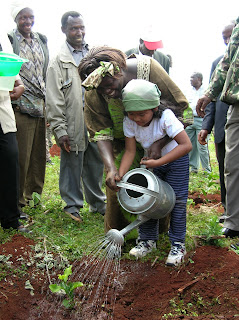Esta mulher nasceu no Quênia em 1940 e faleceu em 25 de setembro de 2011. Foi professora e ativista política do meio-ambiente, e a primeira mulher africana a receber o Nobel da Paz, em 2004.
This woman was born in Kenya in 1940 and died on September 25, 2011. Was a teacher and political activist of the environment, and the first African woman to receive the Nobel Peace Prize in 2004.
Sua luta começa na infância, quando ela deixa seu pai no interior para ir até a cidade grande com sua mãe para continuar seus estudos. Em 1959 segue com mais 300 quenianos para os Estados Unidos por ter ganhado uma bolsa de estudo da Fundação Joseph P. Kennedy Jr. E lá conclui seu bacharelado em biologia.
Her struggle begins in childhood, when she leaves her father to go inside to the big city with her mother to continue her studies. In 1959, following over 300 Kenyans to the United States to have won a scholarship from the Foundation Joseph P. Kennedy Jr. And there concludes her bachelor's degree in biology.
Em 1966, obtém o mestrado em biologia pela Universidade de Pittsburgh, em 1971 recebe o seu doutorado em anatomia na Universidade de Nairóbi e em 2002, foi eleita membro do Parlamento queniano.
In 1966 she obtained a master's degree in biology from the University of Pittsburgh, in 1971 received her doctorate in anatomy at the University of Nairobi and in 2002 was elected member of the Kenyan Parliament.
Mas o que mais chama a atenção, e é a razão pela qual escrevo sobre ela aqui, é o motivo pelo qual ela recebeu o Nobel da Paz em 2004: Wangari ficou conhecida pela sua luta na conservação das florestas e do meio ambiente. Já na década de 1970, ela fundou o movimento do Cinturão Verde Pan-africano (Pan-African Green Belt Network), no Quênia, em uma iniciativa que plantou 30 milhões de árvores.
But what draws the most attention, and is the reason why I write about her here, is the reason why she received the 2004 Nobel Peace Prize: Wangari became known for her fight in forest conservation and the environment. In the 1970s, she founded the Pan African Green Belt Network, in Kenya, an initiative that has planted 30 million trees.
No entendimento desta mulher, a devastação das florestas estava intimamente ligada ao aumento da miséria em seu país e nos demais países ao redor. Ela teve problemas sérios com o antigo regime opressor do Quênia, e, no entanto não se deteve nesta causa, e foi por isto que levou o Nobel da Paz.
In the opinion of this woman, the devastation of forests was closely linked to increased poverty in their country and in other countries around. She had serious problems with the former oppressive regime in Kenya, and yet did not stop in this case and that's why she took the Nobel Peace Prize.
Wangari Maathai morreu de câncer, aos 71 anos, em Nairóbi. Nos últimos anos, ela cooperava com a ONU em um projeto que visava plantar 1 bilhão de árvores.
Wangari Maathai died of cancer aged 71 in Nairobi. In recent years, she cooperated with the UN on a project to plant 1 billion trees.
Será que ela inspirou alguém? Quem se habilita?
Does she inspire someone? Who qualifies?






Grande referência esta mulher, precisamos de mais gente a lutar pela paz sem armas, lutar pelo melhoramento da vida sem pegar em armas de fogo...Que Deus a deia um eterno descanso...
ResponderExcluirEvans Bacar
Obrigado por ler e comentar, Evans. Creio que temos como obrigação resgatar os heróis certos para nossa sociedade. Te convido a fazer o mesmo!
ResponderExcluirAbraço.